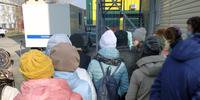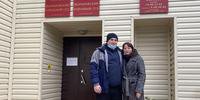Case of Ostapenko in Sharypovo
Filter
- #
The Investigative Directorate for the Sharypovsky District of the Main Investigative Directorate of the Investigative Committee for the Krasnoyarsk Territory and the Republic of Khakassia initiates a criminal case for faith under Article 282.2 (1); According to the investigation, he was active in holding meetings, expressed in public speaking, discussion of biblical scriptures, and prayers. Innocent victims of law enforcement officers are: Ostapenko Anton (born in 1991).
- #
Law enforcement officers detain Ostapenko and place him in custody.
- #
- #
The Sharypovsky City Court softens the measure of restraint for Anton Ostapenko from detention to house arrest.
- #
Anton Ostapenko was released after 246 days in jail.
- #
Senior investigator A.M. Kunko, seconded from Lesosibirsk, petitions for the extension of Ostapenko's house arrest. He believes that Anton can hide from the investigation and put pressure on witnesses. In his petition, Kunko reports that 11 searches were carried out in the case, during which 30 phones, 11 tablets, 1 laptop, 2 system units and other electronic equipment, as well as 95 thousand rubles, were seized from believers.
- #
Judge of the Sharypovsky City Court of the Krasnoyarsk Territory Inga Gavritskaya refuses to extend Anton's detention under house arrest. The judge considers the investigator's arguments to be unfounded, since the believer complied with all the restrictions imposed on him. Ostapenko's house arrest expires on February 19, 2020. After that, presumably, a different measure of restraint will be chosen.
- #
Anton Ostapenko is released from house arrest. After 62 days, the believer can leave his home again.
- #
Senior investigator A. M. Kunko makes a decision on the election of a preventive measure for Anton Ostapenko in the form of a written undertaking not to leave and proper behavior.
- #
Sharypovsky interdistrict prosecutor Vyacheslav Voroshilov makes a decision to return the criminal case for additional investigation. According to the ruling, the accusation against Anton Ostapenko "does not meet the requirements, is not specified, there are significant contradictions ... A number of circumstances... is not confirmed by the materials of the criminal case. In the course of the preliminary investigation, a large number of procedural violations were committed." For example, "the indictment does not indicate the place, time and circumstances under which A. Ostapenko joined the structural unit of the LRO "Jehovah's Witnesses of Sharypov".
The criminal case is returned to the senior investigator of the Investigative Directorate for the city of Divnogorsk of the Main Investigative Directorate of the Investigative Committee for the Krasnoyarsk Territory and the Republic of Khakassia, seconded to the Main Investigative Directorate for the Sharypovsky District of the Main Investigative Directorate of the Investigative Committee of the Russian Federation for the Krasnoyarsk Territory, A. A. Milovanova, for additional investigation and elimination of the identified deficiencies.
- #
Deputy Prosecutor of the Krasnoyarsk Territory Vitaly Stepanov returns the criminal case against Ostapenko to the head of the Main Investigative Directorate of the Investigative Committee for the Krasnoyarsk Territory and the Republic of Khakassia A.E. Potapov for additional investigation and elimination of identified violations of the Code of Criminal Procedure of the Russian Federation.
- #
The head of the second department of the control and investigation department of the Main Investigative Directorate of the Investigative Committee of Russia for the Krasnoyarsk Territory and the Republic of Khakassia, I. N. Soprun, asks the acting head of the SO for the Sharypovsky district, S. A. Baev, to accept a criminal case for his production to organize an additional investigation and eliminate deficiencies.
- #
The case against Anton Ostapenko is submitted to the Sharypovsky City Court of the Krasnoyarsk Territory for consideration by Judge Inga Gavritskaya.
- #
The first meeting on the merits is taking place. About 30 people come to support the defendant. Only the believer's sister is allowed into the courtroom.
The prosecutor reads out the charges. Ostapenko expresses his disagreement with the accusation and informs the court that he does not understand it.
- #
The prosecutor reads out the case materials, including the transcript of prayers obtained using a listening device.
The court interrogates a prosecution witness, FSB officer Andrei Fedorov, who led the investigation into the case. In his testimony, he denies that Ostapenko called on anyone to violent actions against the state and extremism, to rallies, to create armed formations, to promote Nazi paraphernalia, as well as to incite national and religious hatred.
The court rejects the petition to return the case to the prosecutor.
- #
About 30 people come to support Ostapenko. Only one person is allowed into the courtroom. The protocols of the search, as well as philological and linguistic examinations are read out.
- #
The court is interrogating Olga Finogenko, a senior state linguistic expert. The witness reports that, according to her examination of telephone conversations, no calls or motives for prohibited and extremist actions were found in the defendant's statements.
- #
A secret witness for the prosecution, "Ivanov Vasily Sergeyevich", is being questioned, who says that he does not know the defendant personally. About the services that Ostapenko is accused of organizing, he knows that "people just gathered, sang songs."
- #
More than 20 people come to support Ostapenko. Only three people are allowed into the courtroom.
The court examines the witness. He confirms that the Bible was discussed at the meetings of Jehovah's Witnesses he previously attended. Believers, including Ostapenko, respect the state authorities and do not disregard the laws of the country.
- #
About 25 people come to support the believer. Only Anton's sister is allowed to be present in the courtroom.
The judge admits religious scholar Sergey Ivanenko to participate in the trial.
The defendant Ostapenko is being interrogated. He tells the court: "I don't understand this [charge] because what I was doing was peaceful religious activity. And I don't understand why... I am equated with an extremist." Anton explains that his religion is expressed in reading the Bible together, singing songs, and studying the Scriptures.
When asked by the court whether his religion prohibits him from communicating with people of other faiths, Anton explains that there is no such ban, and this proves his friendly and respectful communication with colleagues with different religious views.
The believer informs the court that during his detention he was subjected to pressure of various kinds. Also, according to Anton Ostapenko, he received threats to the health and safety of his loved ones.
- #
The prosecutor asks the court to sentence Anton Ostapenko to 8 years in prison in a penal colony.
The believer addresses the court with the last word.
The last word of the defendant Anton Ostapenko in Sharypovo - #
Judge of the Sharypovsky City Court of the Krasnoyarsk Territory Inga Gavritskaya finds Anton Ostapenko guilty and sentences him to 6 years and 3 months of suspended sentence with a probationary period of 4 years and 1.5 years of additional restrictions.
- #
The Krasnoyarsk Regional Court approves the verdict against Anton Ostapenko.



